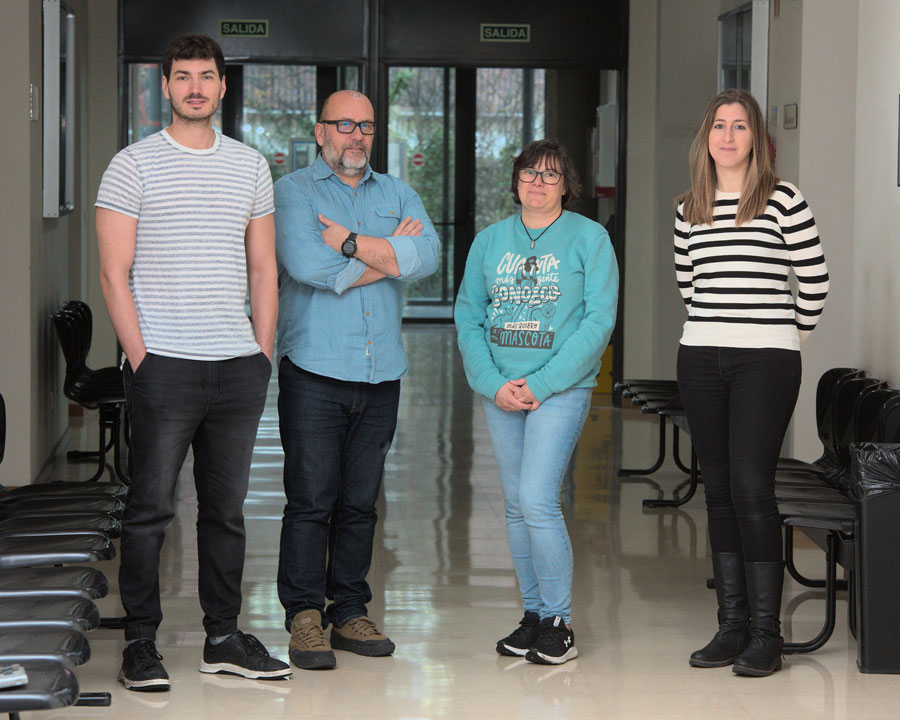UNIT HEAD
Francisco José Rodríguez Díaz
LOCATION
Bioterio, c/Catedrático José María Serrano, 33013, Oviedo, España
Email: rodriguezfrancisco@uniovi.es
RESEARCH LINES
Transgenic mice have become a powerful and extremely useful tool to unveil the molecular mechanisms underlying the crucial steps in carcinogenesis. New mouse models specifically developed to study tumor processes have helped to provide an increasing knowledge about the molecular basis of cancer disease.

Among the several research lines carried out by different groups from Instituto Universitario del Principado de Asturias (IUOPA), our unit has developed so far more than twelve “knock out” mice for different protease genes, which has definitively contributed to expand our knowledge about the involvement of these enzymes in the different stages of tumor progression.
Since the Transgenic Unit was founded in 2008, we have tried to offer IUOPA groups the technological support required for either generate, maintain and share new genetically modified murine models for both gain or loss of function.
Currently the unit is generating new animal models which are deficient in several genes previously identified by different groups from IUOPA, all of great interest in Oncology research.
GROUP HEAD BIOGRAPHY
The Head of the Unit began to work at Dr. Lopez-Otin’s laboratory in 1999 and started working in the generation of knock-out mice under his supervision. Early at the beginning he was in charge of both, manipulation and culture of ES cells. The work accomplished during the first years helped to establish knock-out mice deficient for important proteases as it was further demonstrated: FACE-1, FACE-2, MT-5 and MMP-19. He was also in charge of maintenance of all genetically modified mice generated during this period.
In 2005 he was in charge of setting up the technology required for microinjection and aggregation of previously modified murine ES cells into normal embryos with the intention of creating new chimaeras. These were further crossed back with normal females in order to generate the new knock-out mice deficient for the interested genes. By this way two new mouse models, Aut1 and Mtp2 deficient, were generated.
Finally in 2007, along with the simultaneous opening of new animal facilities at the School of Medicine campus, the IUOPA Transgenic Core Unit started its research activities at this new location, including the responsibility of generating new transgenic and knock-out mice.
SELECTED PUBLICATIONS
- Pendas AM, Zhou Z, Cadinanos J, Freije JM, Wang J, Hultenby K, Astudillo A, Wernerson A, Rodriguez F, Tryggvason K, Lopez-Otin C. Defective prelamin A processing and muscular and adipocyte alterations in Zmpste24 metalloproteinase-deficient mice. Nat. Genet. 2002 May;31(1):94-9.
- Pendás, A.M., Folgueras, A.R., Llano, E., Caterina, J., Frerard, F., Rodríguez F., Astudillo, A., Noel, A., Birkedal-Hansen, H., & López-Otín, C. Diet-induced obesity and reduced skin cancer susceptibility in matrix metalloproteinase 19-deficient mice. Mol. Cell. Biol., 24, 5304-5313 (2004).
- Varela I, Cadiñanos C, Pendás AM, Gutiérrez-Fernández, Folgueras AR, Sánchez LM, Zhou Z, Rodríguez FJ, Stewart CL, Vega JA, Tryggvason K, Freije JM, López-Otín C. Accelerated ageing in mice deficient in Zmpste24 protease is linked to p53 signalling activation. Nature. 2005 Sep 22;437(7058):564-8.
- Alicia R Folgueras, Fernando Martin de Lara, Alberto M Pendas, Cecilia Garabaya, Francisco Rodriguez, Aurora Astudillo, Teresa Bernal, Ruben Cabanillas, Carlos Lopez-Otin, and Gloria Velasco.The membrane-bound serine protease matriptase-2 (Tmprss6) is an essential regulator of iron homeostasis. Blood, Jun 2008.
- Mariño G, Fernández AF, Cabrera S, Lundberg YW, Cabanillas R, Rodríguez F, Salvador-Montoliu N, Vega JA, Germanà A, Fueyo A, Freije JM, López-Otín C. Autophagy is essential for mouse sense of balance. Journal of Clinical Investigaions. 2010 Jul 1;120(7):2331-44.
- Pedro M Quirós, Andrew J Ramsay, David Sala, Erika Fernández-Vizarra, Francisco Rodríguez, Juan R Peinado, María Soledad Fernaández-García,José A Vega, José A Enríquez, Antonio Zorzano, Carlos López-Otín. Loss of mitochondrial protease OMA1 alters processing of the GTPase OPA1 and causes obesity and defective thermogenesis in mice. The EMBO Journal (2012), 1-17.
- Pedro M. Quirós, Yaiza Español, Rebeca Acín-Pérez, Francisco Rodríguez, Clea Bárcena, Kenta Watanabe, Enrique Calvo, Marta Loureiro, M. Soledad Fernández-García, Antonio Fueyo, Jesús Vázquez, José Antonio Enríquez, and Carlos López-Otín. ATP-Dependent Lon Protease Controls Tumor Bioenergetics by Reprogramming Mitochondrial Activity. Cell Reports 8, 1–15, July 24, 2014.

Members
| Name | Position | Phone | |
| Francisco José Rodríguez Díaz | Jefe de grupo | rodriguezfrancisco@uniovi.es | 985102731 |
| Aranzazu Moyano Molina | Técnico de laboratorio | moyanoaranzazu@uniovi.es | 985102731 |
| Rebeca Feijoo Rodríguez | Técnico de laboratorio | feijoorebeca@uniovi.es | 985102731 |

